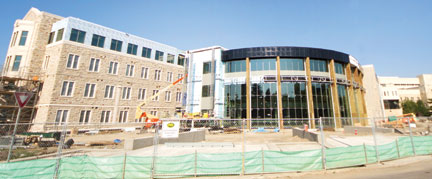College of Medicine moving forward with accreditation action plan
With a comprehensive action plan in place and changes already being implemented, the dean of the University of Saskatchewan’s College of Medicine is confident the accreditation bodies for medical schools in Canada will be satisfied with the college’s progress toward full compliance with accreditation standards.
By Colleen MacPherson Dr. William Albritton said the action plan addresses 10 areas of non-compliance among the 130 accreditation standards set out by the Liaison Committee on Medical Education (LCME) and the Committee on the Accreditation of Canadian Medical Schools (CACMS). While the college maintains its full eight-year accreditation, the two committees require it to address the 10 areas of non-compliance that Albritton described as largely administrative. "They are all being addressed," he said, "and they (the accreditation bodies) are coming back in March 2013 for a limited site survey to cast fresh eyes on the previously identified weaknesses."
Dr. William Albritton said the action plan addresses 10 areas of non-compliance among the 130 accreditation standards set out by the Liaison Committee on Medical Education (LCME) and the Committee on the Accreditation of Canadian Medical Schools (CACMS). While the college maintains its full eight-year accreditation, the two committees require it to address the 10 areas of non-compliance that Albritton described as largely administrative. "They are all being addressed," he said, "and they (the accreditation bodies) are coming back in March 2013 for a limited site survey to cast fresh eyes on the previously identified weaknesses."
Included in the action plan are issues such as removing delays in reporting students' final marks, providing consistent mid-rotation feedback for students and creating a centralized review of student performance data. Changes to administrative procedures and meetings with college faculty and staff are moving the plan forward, he said. Later this year, college administrators will travel to Regina to ensure faculty and staff in that location are also fully aware of the requirements and their responsibilities in meeting the accreditation standards.
Albritton added that although all 17 medical schools in Canada currently have full accreditation, "there's not a single one that isn't dealing with issues of non-compliance."
One of the challenges in the compliance process is the heavy workload for both students and faculty. Albritton pointed to the requirement that the college increase awareness of its mistreatment policy. "We give students a lot of information at the start of the year and maybe a pile of that gets set aside. They may simply not remember that they've received that information." Another area of non-compliance—sharing information about the objectives of a medical education program—requires deliberate reminders "as a way of supporting busy faculty, faculty with clinical responsibilities as well as teaching and research responsibilities."
The dean added that it is important to understand that the LCME and CACMS surveyors who will visit the college next year will not be expecting everything in the action plan to be completed. "They're looking to see that we've got a plan, that the plan will fix the problem and that changes are underway."
In addition to following the action plan, the dean said faculty, staff and students in the college are considering a concept plan that describes structural changes including the creation of three new divisions to support increased research performance, clearer accountability for clinical instruction and streamlined service to the health regions. Developed by Albritton, Provost and Vice-President Academic Brett Fairbairn and Martin Phillipson, acting vice-provost faculty relations, the proposed structure is designed to ensure the college maintains full accreditation for the long term.

